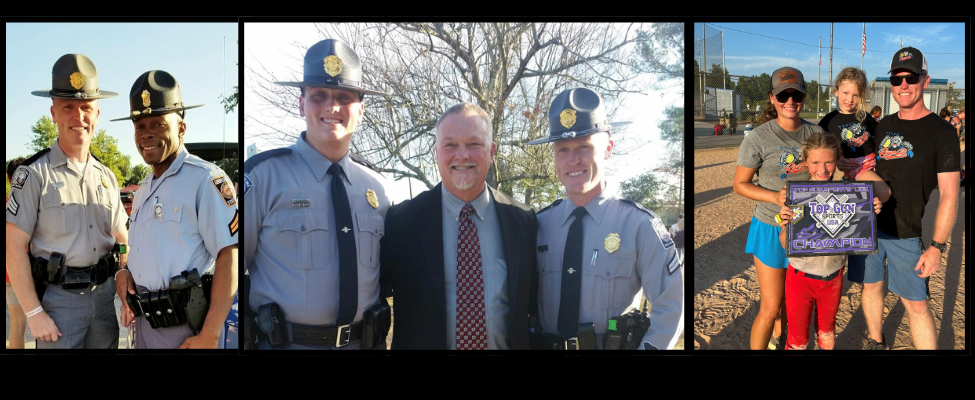
First Sergeant Joshua Cannon was never one to talk about his feelings or experiences. Such things, he thought, had no place in his work as a South Carolina state trooper, or even in conversations with coworkers and family. Instead, they stayed buttoned up and neatly tucked away behind a crisp gray Highway Patrol uniform.
But after years of bottling up the gruesome sights he saw in working fatal collisions, the raw emotions from notifying people of a loved one’s death in a collision, and the general dangers of the job — those feelings and emotions were spilling over both at work and home. He was about to have his first introduction to the South Carolina Law Enforcement Assistance Program (SCLEAP), whose services he was aware of but mostly bypassed.
“I was withdrawing. I wasn’t stopping cars as much as I was before,” Cannon said, recalling his declining work performance amid a divorce in 2008. “I didn’t want to come to work. My mind was not on the job; it was on the situation at home.”
But with five words one night at the Troop 3 office, a supervisor, who had noticed a change in Cannon’s performance, broke the seal on what he had bottled up for so long: “Hey, man, are you alright?”
And that’s all it took to open the door,” said Cannon, who was connected the next day with SCLEAP and a therapist, who through 10 sessions helped him unpack years of repressed memories, feelings, and experiences.
It did me so much good to talk with somebody who wasn’t involved and didn’t know me, and just dump all of that toxic waste and get it out,” Cannon said.
In a profession that, historically, has encouraged compartmentalization and associated mental health as a sign of weakness, Cannon knows he has an uphill battle in his new role on the Peer Support Team for SCLEAP. But it’s a battle worth fighting, he says, and one that hit home for his family on June 22, 2019, when his brother completed suicide at the age of 26.
I knew he was having a hard time, but I didn’t fully grasp just how bad this had gotten,” said Cannon, whose pleas to reach out to SCLEAP were met with apprehension from his brother. “He was very cautious about what he told me. He would tell me what he wanted me to know, but he wouldn’t tell me everything.”
Trooper First Class Jesse Cannon was one of 198 U.S. law enforcement officers to die by their own hand in 2019, according to Blue H.E.L.P., a nonprofit that works to reduce the stigma associated with mental health in law enforcement. That number has fluctuated since then, and 2023 saw a 30-percent decrease in law enforcement suicides, according to the nonprofit.
After Jesse died, Cannon, who has remarried since his divorce in 2008, again sought the services provided by SCLEAP, and made a vow that his brother’s death would not be in vain.
“We always said after Jesse’s event that something good would come of it,” he said. Since then, both he and his wife have become Peer Support Team members with a goal of helping other officers in similar situations and changing the culture surrounding mental health in law enforcement.
SCLEAP boasts a variety of resources for law enforcement officers and their families, from post-critical incident seminars and traumatic loss seminars, to counseling, alcohol rehabilitation, and chaplaincy services, and even a cabin in the North Carolina mountains for first responders and their families to relax and disconnect.
The Peer Support Team is SCLEAP’s first line of response after a critical incident, said Captain JoNathan Nell, a retired Troop 5 commander for the Highway Patrol and Peer Support and Wellness Coordinator for the Department of Public Safety. Mostly volunteers, peers act as liaisons between SCLEAP and their respective agencies and are trained evaluate the needs of a trooper or officer and their family to connect them with the necessary resources.
“We’re going to go see him or her as a peer, talk with them, and make sure they are OK,” Nell said, explaining a hypothetical scenario. “If we see that they need more help, we’re going to have a debriefing, and that’s kind of the first stage.”
Cannon knows from experience that help is difficult to ask for and sometimes even more difficult to accept.
“That’s the fear in law enforcement — that I’m going to be ruined, that I’m going to be ostracized (for seeking help),” he said.
But burying those feelings or emotions can have devastating consequences later, said Cannon, who compared it to constantly placing items on a shelf over time.
“As you continue to work, you’re going to continue putting things on that shelf,” he said. “Eventually it’s going to get full, and as you put more on there, something is going to get pushed off.”
Cannon’s wife, Rachel, has been an especially good resource for spouses of law enforcement officers and first responders. Their goal is to extend a caring hand to every law enforcement officer or first responder trapped in that darkness and help them out of it. Cannon knows this, sadly, will not always be the case. But, in thinking back to some words from the eulogy he gave at his brother’s memorial service, he said it is still worth the fight.
“You’ve got to fight before you can win any battle,” he said. “I know Jesse didn’t win his battle, but he was fighting, and that matters.”
To engage with this story on our DPS Facebook page, please click here: #FeatureFriday... - South Carolina Department of Public Safety | Facebook
